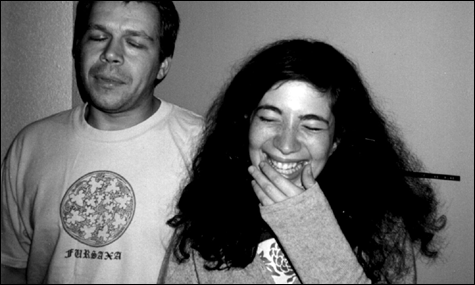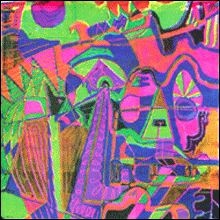Providence label Secret Eye thinks globally, acts locally
By ANDREA FELDMAN | July 10, 2007

HUNTER-GATHERERS: Alexander and Goldberg. |
Every action has an equal and opposite reaction. Consequently, for every high-gloss record label driven primarily by commercial concerns, there are (thankfully) any number of smaller-scale labels putting beautiful sounds out into the ether, purely as a labor of love. In this vein, Providence’s Secret Eye Records has been pursuing its own idiosyncratic path since its inception more than four years ago.
Co-run by Black Forest/Black Sea’s Jeffrey Alexander and Miriam Goldberg, the label is home to an eclectic mix of acts both homegrown and international. Their curatorial scope runs pell-mell from sepia-toned, pastoral Americana to frantic Krautrock drones and mind-expanding, psych-jazz improv. Picking up one of their releases means acquainting yourself with unusual instruments like the shruti box, the mbira, the bul bul tarang — alongside more commonplace elements like cello, tape loops, vintage synths, and guitar. The label’s ever-shifting roster runs the stylistic gamut from extroverted, organic mysticism (Spires That In the Sunset Rise) and chaotic Faustian improv (Finnish sound collectors Avarus) to the ecstatic, dreamlike echoes of Appalachia folk (Larkin Grimm, Kathleen Baird), and BF/BS’ own delicate cello-laden soundscapes.
While Goldberg concedes that there isn’t an overriding aesthetic at work — she and Alexander release what they love, period — she puts their label’s modus operandi in anthropological terms: “Some labels are like farms. They cultivate sounds and develop their artists, which results in a catalog of corn, veal, and tomatoes: juicy, well-formed, and consistent. Jeffrey and I are more suited to being hunter-gatherers. We find and distribute the stuff we like as we find it, so our catalog is filled with berries, venison, and fiddleheads — more gamy, pungent, sometimes stringy or gritty and inconsistent.” Which is to say that, whether the music is rough-hewn or polished, it’s never anything short of genuine.

THE GOODS: Recent release by Avarus. |
If the label has a spiritual and aesthetic forebear, it would be pioneering ’60s outfit ESP-Disk, whose label head Bernard Stollman shunned commercial pressures in favor of an often startlingly iconoclastic output. (ESP-Disk released radical projects by the likes of the Fugs, Pearls Before Swine, Patty Waters, and Sun Ra, among others.) Coincidentally, Pearls Before Swine songwriter Tom Rapp christened Alexander and Goldberg’s nascent label, deriving the name from one of his old songs. As payment, Alexander laughs, “he gets a copy of every release in perpetuity.”
Secret Eye began in 2003, but Alexander was already a veteran record label impresario, having begun the Magic Eye Singles Club (later simply Magic Eye) in Baltimore with partner Robbie Nichols. Self-sufficient by the time Alexander relocated to Providence in 1998, the venture suddenly hit rocky waters when their distributor went ignominiously belly-up. Disgusted with the music business, Alexander folded the label, only to realize it was too late: “I’d [already] been bitten by the bug.”
Thirty-odd releases later, Secret Eye has found a modest level of success. Co-producing last year’s massive Terrastock festival in collaboration with AS220 and Ptolemaic Terrascope magazine helped raise its profile, but it also marked, “the biggest Secret Eye nail-biter,” Miriam says, understatedly. “For awhile there, we thought we might lose our shirts and that the whole thing would fall apart.” Ultimately, though, the gamble paid off more than handsomely: “We broke even, people came, bands played, friendships were forged. The festival itself was one of the best moments of my life.”
| Eye Secretions releases, including the new Avarus/Manbeard split, are available via secreteye.org and at the Armageddon Shop, 436 Broadway, Providence | 401.521.6667 | armageddonshop.com |
Future plans include a greater focus on Eye Secretions, their CD-R sub-label. Miriam explains,“[It’s] a way for us to stay flexible and get music out there without having to deal with all of the machinery that can delay releases. It also allows us to keep our dollars local by hiring our friends to screen-print sleeves, rather than farming it out to some manufacturer in Canada. And besides — MP3s don’t come with beautiful artwork made by your friends and neighbors.” The most important thing to remember, she adds, is that “a label is just a means to an end and that end is music.”
 Related
Related:
 Topics
Topics:
Music Features
, Jeffrey Alexander
, Miriam Goldberg
, Pearls Before Swine
, More  , Jeffrey Alexander
, Miriam Goldberg
, Pearls Before Swine
, Social and Behavioral Sciences
, Anthropology
, Entertainment
, Science and Technology
, Music
, Tom Rapp
, Sun Ra
, Less
, Jeffrey Alexander
, Miriam Goldberg
, Pearls Before Swine
, Social and Behavioral Sciences
, Anthropology
, Entertainment
, Science and Technology
, Music
, Tom Rapp
, Sun Ra
, Less 